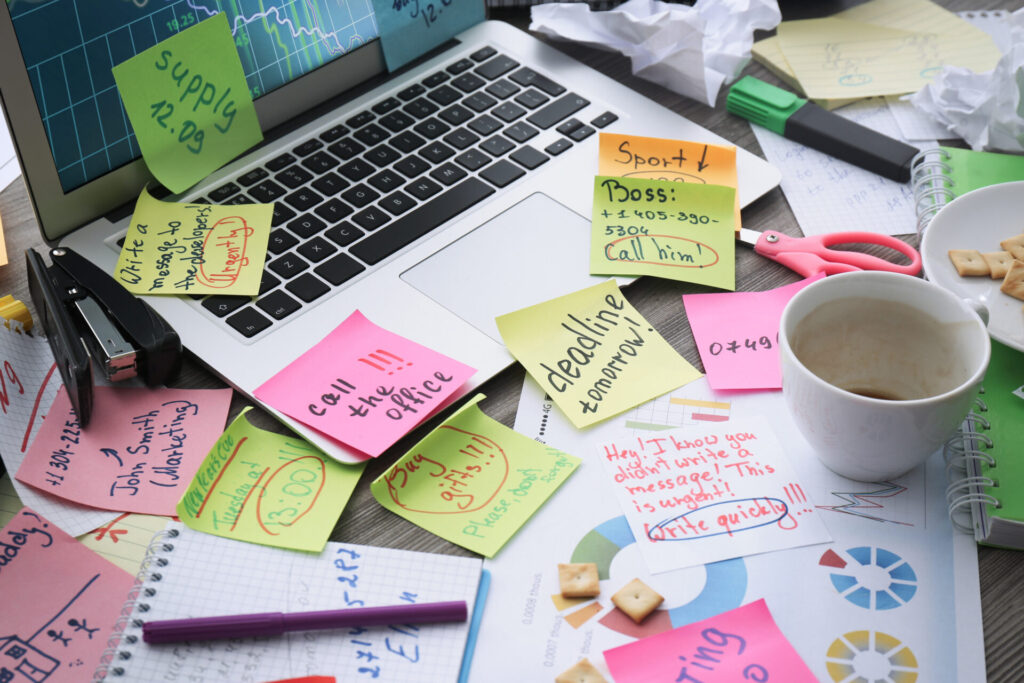Tasha despairs when she looks at her to-do lists. There are household jobs to do, plumbers and electricians to book, friends and colleagues to invite to dinner, podcasts to listen to, blogs to read and relatives to visit. Then there are her work tasks, which increase by the day. Her emails seem to multiply by the minute, and her social media just keeps on coming. It’s all rather, overwhelming.
‘There’s no way I can get that lot ticked off,’ says Tasha, who’s mum to 17-year-old twins. ‘I once estimated how much time I’d need to get everything done, and it added up to about six months. That was if everything was static and nothing new came in or went wrong, which is obviously never the case. I feel like I’m scurrying along on a treadmill, getting nowhere fast.
‘I fantasise about Inbox Zero, being up to date with the news and being able to sit down and relax, knowing that all my jobs are done. If I could just get a little along the way, I’m sure I’d feel far less panicky and stressed. But deep down I know that’s an impossible dream. I sometimes feel my brain is just shutting down.’

Tasha, 51, is suffering from overwhelm – the feeling that she can’t cope with her life. In turn this is causing her anxiety, and the harder she tries to conquer her workload, by doing more, the worse she feels.
But she isn’t alone in this never-ending overwhelm cycle. The most recent Ipsos World Mental Health Day report revealed that globally just over three in five people – 62 per cent on average across 31 countries – have felt stressed to the point where it had an impact on their daily life at least once.
And according to life coach Adam Zargar, founder of UAE Coaching in Dubai, some of us will be more at risk of overwhelm than others, depending on our personality type.
‘People with perfectionist personalities suffer from overwhelm worse,’ explains Adam. ‘When I was a teacher, some of my colleagues were up all night, working long hours, making displays and laminating work. I did much less of that kind of thing, as I deemed it not as important as being high energy the next day and engaging with the kids.
‘Achievers are also at risk. While they can be tireless go-getters, they can also be unbalanced, overcommitted and unable to say no.’
The Hidden Cost of Overwhelm
So, far from being a case of just having too much to do, overwhelm shouldn’t be taken lightly. Its effects on both mind and body can be devastating, as Adam points out.
‘Over time, you’ll get a sense of stress and anxiety,’ he warns, ‘and this will leave you feeling drained. It could ultimately lead to burnout. Feeling overwhelmed will impact your sleep and, if left untreated, it could over time increase your risk of stroke.
‘As far as your mental health goes, you could suffer depression and severe anxiety. If you always feel you’re not achieving, your sense of self-worth is at severe risk.’
‘With advances in social media and mobile phone usage, we’re being pulled into many things at once. Emails and WhatsApp on our phones and even our watches mean we’re at the mercy of the notification beep’
Adam Zargar, founder of UAE Coaching
But why – when we have all the mod cons to make our day-to-day lives easier – are we so overwhelmed these days?
Adam believes we’re frittering away our precious hours on often meaningless things because we’ve lost sight of what’s truly important.
‘So much time is being distracted away,’ he adds. ‘This means the important, yet non-urgent jobs, that would normally add value to our lives are not being done. They’re just piling up,’ says Adam.
‘With advances in social media and mobile phone usage, we’re being pulled into many things at once. Emails and WhatsApp on our phones and even our watches mean we’re at the mercy of the notification beep.

‘The notification comes, and our attention goes from what was important (chatting to our children, for example) to our phones, and we have this sense of immediacy to answer. For some people, the pull to reply is too much.’
The secret to overcoming overwhelm, he says, is to use the Eisenhower Matrix, a time management tool, which distinguishes between important and unimportant things, and the urgent and not urgent.
‘There will always be things to do,’ states Adam. ‘The difference is some are urgent and important. These things have clear deadlines and should be done right away. They could be finishing a work project, collecting your unwell child from school or submitting an article.
‘Then there are the not urgent yet important things that bring you closer to your goals, things like forward planning, networking and exercise. These should be scheduled in and put as a priority to keep us moving forward, both professionally and personally.
‘Urgent but not important things are jobs like replying to some emails or uploading blog posts. They don’t need your specific skills so they could be delegated.

‘Then there are the not urgent, not important things like scrolling through social media, watching television and playing video games that could be deleted from your list.’
How to Break the Cycle
So, with those guidelines in mind, should we take our red pen and cull our to-do list?
Life-work balance coach Maham Malik, who is based in Abu Dhabi, thinks so. In fact, Maham goes a step further and questions why we put all those things on our to-do list in the first place.
‘Feeling overwhelmed is a self-inflicted pressure,’ she says. ‘If we write down all that we want to tackle in 24 hours, we’d notice how much of it is unnecessary.’
And she points out the lack of logic that’s creating our sense of overwhelm.
‘Out of the 24 hours, how much can realistically be achieved?’ she asks. ‘You will have daily must-do or non-negotiable tasks like the school drop off, work and meal prepping. How much time have you put down for self-care, your workout, time with your children before they go to bed?
‘Remember we can control what goes on our to-do list. Not being able to manage often ends up in a loop of dissatisfaction, panic and anxiety. It has a ripple effect on family, health and work, and it’s nobody’s win.’

So how can we avoid overwhelm and focus on the things that matter? Adam and Maham share their tips.
Take five
Choose five things that are really important to you, suggests Adam.
‘You might pick relationship, fitness, career, children and friends,’ he says. ‘Then write down one step you’ll take the next day for it. When you’ve taken that step, tick it off and repeat with another step the next day. This gets you working on the important things and gets them in your calendar as a priority.’
Have an hour of power
Use the first hour of your day purely for yourself and your energy, recommends Adam.
‘If you do five rituals – they could be meditating, writing a gratitude list, doing some stretching, having a healthy breakfast and walking in the sunshine, for example – before 8am, you’ve put yourself first and you’ve recharged your batteries. This sets you up to tackle the day ahead.’
By definition, emails and messages aren’t important. If they were crucial, people would call you. Waiting a few hours will put you back in control.
Celebrate wins
However small your success may seem, celebrate, urges Maham.
‘Waking up on time is a win. You didn’t snooze or oversleep. Getting out of the house on time without rushing is a win,’ she says. ‘Sorting your emails before 9am is another win. Celebrating is like a mental pat on the back – it’s like cutting yourself some slack and seeing positivity and contentment in your actions and behaviour.’
Zap those emails
Schedule two times in the day when you will be focused – check your emails and WhatsApps and reply properly then, says Adam.
‘You could check them at 10am and then again at 6pm,’ he says. ‘By definition, emails and messages aren’t important. If they were crucial, people would call you. Waiting a few hours will put you back in control. In the meantime, turn off notifications. You could even remove these from your phone and have them only on your laptop.’
Do a mind dump
Before bed, write down everything on your mind, recommends Adam.
‘For each one, ask yourself is there’s something you can do to make it easier or resolve it. If there isn’t anything you could do about an issue, cross it off. If you could do something, write down the next step. It could be an appointment that needs booking, or someone you need to call. This makes your brain calmer for sleep.’
Know your goals
Set clear, short-term goals to keep you focused on what’s important, urges Maham.
‘Be realistic. If you want to save X amount of money in five months, work out how much you can realistically put away each month after expenses,’ she says. ‘If you want to create a business, make a clear step-by-step plan. Give each step a timeline and work towards that. If you want to lose weight, think of it in 3kg steps, not the whole 12kg in one go. This will focus your attention on the things that are important to you.’
For more information about Adam’s work, go to UAEcoaching.com









